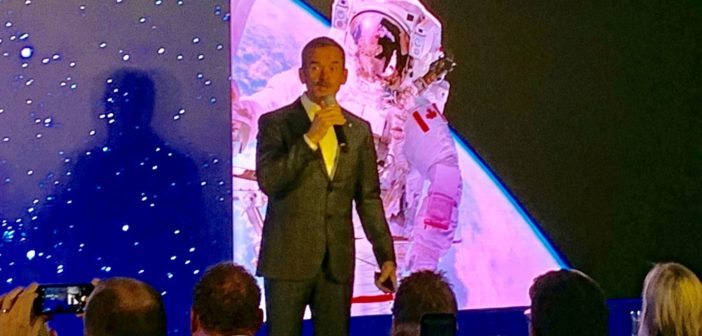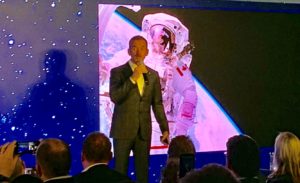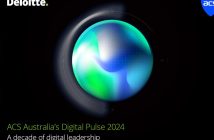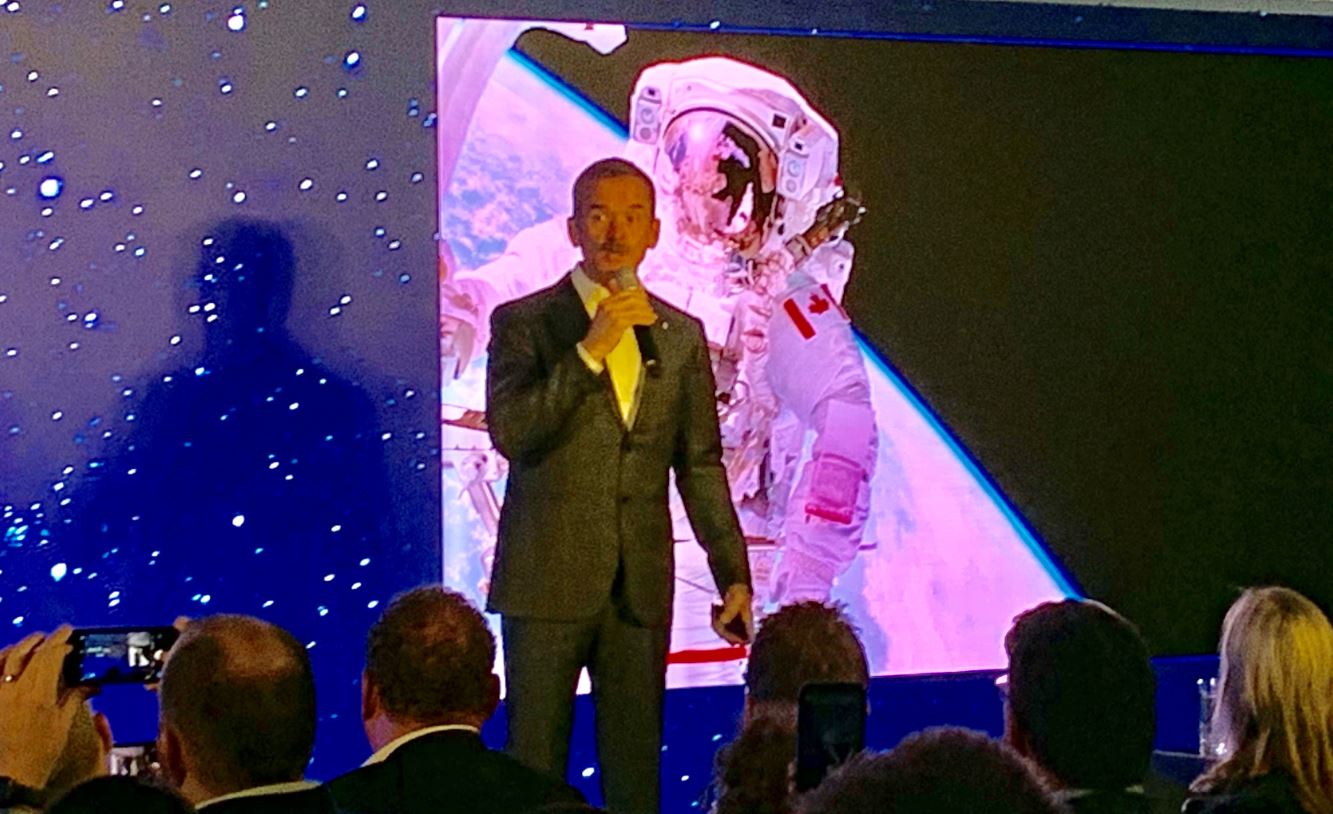
Recorded on 6 June 2019 on the Quayside Room Balcony, Museum of Contemporary Arts, overlooking Circular Quay, Sydney, courtesy of AMP Amplify 2019. (Apologies for the challenging audio conditions and resulting quality – full transcript below)
Welcome to the Cyber Security Weekly Podcast an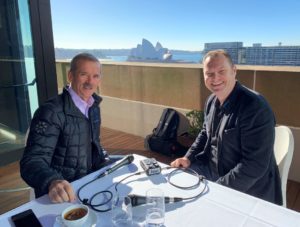 d recording on a beautiful sunny morning in Sydney. My name is Chris Cubbage (‘CC’) and we are joined by a very special guest, as part of the AMP Amplify 2019 Forum, and our special guest is Canadian astronaut and now the custodian of David Bowie’s ‘Space Oddity’, Colonel Chris Hadfield (‘CH’). Chris thanks for joining us.
d recording on a beautiful sunny morning in Sydney. My name is Chris Cubbage (‘CC’) and we are joined by a very special guest, as part of the AMP Amplify 2019 Forum, and our special guest is Canadian astronaut and now the custodian of David Bowie’s ‘Space Oddity’, Colonel Chris Hadfield (‘CH’). Chris thanks for joining us.
CH: A beautiful Sydney morning here Chris, thanks.
CC: You’ve been to Sydney many times and you’ve flown over Sydney thousands of times I’m sure. You gave a keynote session to close AMP Amplify yesterday afternoon, speaking to about 150 people. It’s an inspiring and awesome session and you received a standing ovation at the end. I’m sure you get that around the world?
CH: It’s a huge compliment. Having been off the earth three times. That’s about half a year on board a spaceship, gives you time to contemplate and think about the variety of life on Earth but also the commonality of life on Earth. And as far as we can tell, the absolute, unique preciousness of it. So, to come to Sydney and talk, essentially to a bunch of strangers, about ideas and about possibilities and have them honour me by standing up and applause at the end, it’s a wonderful privilege.
CC: Well you mentioned there’s ten thousand ideas bolted together on the Space Shuttle and the launch, and those types of things. For our audience which is predominately cybersecurity technology, you spent many months on the International Space Station. There’s a lot of activity in Australia around the new space agency. We’re seeing the militarisation of space. But one of the things I wanted to capture from your session yesterday. You’re dealing in that advanced tech environment and you talk about leadership, team building and ultimately, again linking it back to cybersecurity, is preparing for failure. The inevitable aspect of failure. Just your thoughts around that first and then certainly we’ll grab your ideas and experiences in cyber security and space.
CH: You know Chris I think it’s even more than the inevitability of failure, it’s the necessity of failure.
If you want to tiptoe around everything and never have anything go wrong. It’s almost impossible to accomplish anything. You have to not only accept the fact that things are going to fail, things are going to go wrong, but eagerly look for it. Try and push your system under as safe and early, as circumstances possibly can, to the point of failure. It’s why we do non-destructive testing. But we often, when things get expensive enough or complex enough, we sort of stop thinking of the necessity for failure and instead try and cross our fingers and hope for perfection. And just because we’re hoping and crossing, doesn’t mean that’s going to happen.
There’s been an enormous change in space exploration over the last 15 years as a result of shifting that mindset. Of going from the way that the governments have traditionally approached space travel, to the way private industry is doing it now the way, with Space X and Virgin and Blue Origin’s Jeff Bezos. The way they’re approaching it, it’s almost like you roll out a new software package. You recognise it’s going to have bugs. You do an update on a regular basis but you get it out there and working and build a safety net around it. So, the failure is acceptable. That it’s okay and you learn the most when something goes wrong. If everything works the first time, you’re sort of like, you’re just tiptoeing, whistling past the graveyard. Well eventually, it’s going to fail. The sooner it can fail, the sooner it can show you what still needs working on, the better. Whether it’s cybersecurity or whether it’s a whole space ship.
CC: Do you think it might be, or have been, an advantage in that environment. Trying to translate and communicate that into a business environment where business seems to be risk averse to failure. Again, in technology and in our digital transformation. Do you think we should be more accepting of failure in business?
CH: Well of course you don’t want the actual business itself to fail. But what are you doing when things are going well? It’s kind of the real question. Are you aggressively pursuing the things that are the highest probability of going wrong? What are you most vulnerable to?
You know, if there’s a change in commodity price or if there’s a shift in regulation or if some other nation suddenly creates a competitive version of your product or whatever. Just like how I’ve approached my entire life, as a test pilot and as an astronaut, we used to always say; ‘what’s the next thing it’s going to kill me?’ Because that’s the only thing that really matters. What’s the next thing that’s going to kill me? And am I ready for that to happen or not. And if I’m not, then let’s use every second that’s available up until that moment to get ready for that. Because then if it doesn’t happen, no harm. If it does happen then the business doesn’t crash or the spaceship doesn’t crash. And it doesn’t apply just to spaceships or businesses, it applies to operating a car or how you run your own life.
The inevitability of anticipating failure and then simulating it and training for it and learning how to deal with it, so that when it does happen, you’re not flummoxed and stopped or worst case, killed by it.
CC: Of course. Let’s touch on cybersecurity in space and the level of training that you would have had. And again, the precautions.
CH: It’s a funny thing. You wouldn’t believe it but all of the computers onboard the space station have a password. I just thought it was funny, there was only six of us up there.
CC: Please don’t tell me it’s ‘admin’ ‘password’.
CH: Who were we keeping the secret from? That’s just the way it is. So, I even posted something on Twitter there, I think at one point. I said, just in case aliens come by, we’ve got passwords logging in all the laptops up here. Even logging into our exercise treadmill, you had to know the password. So of course, we just grease pencilled it on the wall.
CC: So, the post-it notes are on the International Space Station. Good to know.
CH: But we do take it really seriously, in that the space station is 100 percent digital. Operated in concert with the crew on board and mission controls all around the world. There’s one in Moscow, one in Munich, one in Tokyo, one in Montreal and one in Houston. All of them are in high speed, continuous digital communication with the space station. So of course, the security of that is huge. If someone could somehow tap into it or get a command. Because we get e-mails up and down all the time, if someone put something into there, that would be any sort of malware, it could have deathly consequences for the crew on board.
And there’s only one space station for the whole world. So, we take it very seriously and everything is scanned to the best of our ability. We regulate the type of files that can go up and down. But right down to anti malware that’s onboard the space station itself. Amongst everything else that’s going on, we also very much worry about our software not getting messed up.
CC: You must have seen that sort of progression of technology across that. Even you talk about from your early childhood, all the way through. Then to actually be sitting up there and then to be doing YouTube videos, throughout to the world. Where do you see this heading? What is your projection? I suppose to close this off.
CH: The space station is relatively primitive computer technology. The space shuttle was ridiculous. 128K memory ran the entire space shuttle. These little, very primitive, old, proven, space hardened computers. The space station, its core hardware is that way.
But we run a lot of laptops on board to run all the various sensory systems. There’s over 100 laptops on board. So, it’s sort of piggybacking on top of the framework that runs the space station itself.
But if you look at the new vehicles. The new one that Boeing has put out, which is Star Liner and the one that Space X has, which is their Crew Dragon. They’re really taking advantage of the technology. A much more updated crew interface, much higher memory onboard. And that’s just the start. We want to take advantage of the early glimmerings of artificial intelligence. We don’t want to have to manually do everything all the time of course, like the Apollo guys did. There were five hundred mechanical switches in the cockpit of the space shuttle. And you had to be intimately familiar with everything. Really analogue kind of vehicle.
But it’s becoming more and more digital like it ought to. That makes things lighter. Easy to make more levels of redundancy. Easier to control from a remote location. So, we need all of those things. And as we’re heading towards now, going beyond Earth orbit, putting robots, and relatively soon people, permanently on the moon, we will want as much artificial intelligence, as much robotic help, as we can possibly get for the first settlers that are living on the Moon. And just paving the way for going even further. And I’m all for artificial intelligence. We need to learn how to control it. Like gunpowder and like fossil fuels, and all the other things that enable life, but also can have a detrimental effect. We need to learn how to integrate those responsibly into society. Artificial intelligence is the same thing. There are ways to do it. We’ve got a lot of precedents. But the advantages it can give us are huge and especially in the realms of exploration where it’s still very difficult to get to people there.
CC: So you’re talking and you can foresee a base on the moon and then moving that, using that as a sort of, as you say a base or a satellite, to move on. And the International Space Station, the future of that will be continued do you think?
CH: The space station, the first space was launched in 1998, with a planned 30 year life, so till 2028. Another 10 years or so. And that’s the first piece. There’s been lots of pieces gone up in the last decade. So, the station, assuming that we all can manage to agree to continue to work it and we will, I think we’ll be up there until the late 20s, maybe early 30s. We’ll see. When the big pieces start wearing out and breaking, just like any old car, it’s just a machine, creates more maintenance with time, like an old car.
CC: You don’t want to be on there at the time.
CH: But eventually, we’ll just have to declare the end of its life and deorbit it into the South Pacific, it’ll mostly burn up, just like we did with the previous space stations. But by then we should have people orbiting the moon and living on the surface of the moon and just laying the groundwork for going further.
And it sounds crazy and fanciful, and impossible. But when I was born no one had flown in space. All of this has happened in less than my lifetime and our early desperate flights were so hairy edge, crazy dangerous. And yet now we’ve had people living permanently on the space station for the last 19 years. And you hardly hear anything because it’s just normal and safe, and part of what humans can do.
So, you don’t have to look too far into history to realise technology enables exploration and then settling into a new environment. You can look at New Zealand 800 years ago or Antarctica 50 years ago or space 20 years ago and very shortly the Moon. I’m realistically optimistic that’s where we’re headed. The real key is we need to keep it safe. We need to keep it productive. As part of the whole earth, moon economic system.
CC: If anything, I think from what I take from you is also keeping it humble. That we are alone in this and we have to work together. It’s a big takeaway.
CH: Yeah, it’s really important to use the inspirational and complex things in society to unite us. If you can do it all by yourself, that’s fine. But if the very necessity of it drives people to work together, that’s a good side benefit. And fifteen of the leading nations of the world have been working hand in glove for a quarter century on the International Space Station. There’s hardly any project that parallels that. And you can look up any night or morning, early in the morning, just before the sun rises all across Australia, and watch the space station go over. And it’s a good reminder of what we can do together, when we do things right.
CC: Well I’m originally from Perth. A WA boy and you mentioned Perth many times. Look you do talk in extremes and the impossibilities. If anyone listening in our audience has the opportunity to see your presentation, they must take it. You’ve got the best holiday picks anyone has.
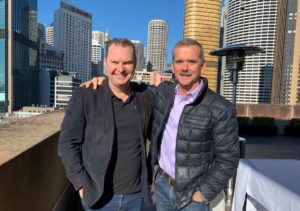
CH: I’ve been extremely lucky in my life. I’ve worked hard. I’ve been willing to take some enormous risks, as a test pilot and then as an Astronaut. But with great risk often comes great reward. To me the rewards are almost hard to explain to myself, but thank you for the compliment. I do my best to explain it to as many people as possible.
CC: Look you’re a standout individual. You mentioned the stats yesterday. There’s 18,000 applications to be an astronaut and 12 are selected and I think you are one of a kind and doing a lot for humankind. So, thank you very much it’s been an absolute pleasure.
C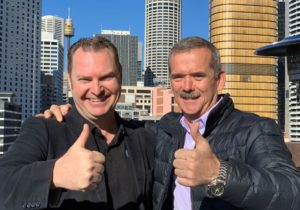 H: Nice to talk with you Chis, thanks.
H: Nice to talk with you Chis, thanks.
CC: Colonel Chris Hadfield, thanks for joining us on the Cyber Security Weekly Podcast.
CH: Pleasure, take care.
CC: Cheers mate.

